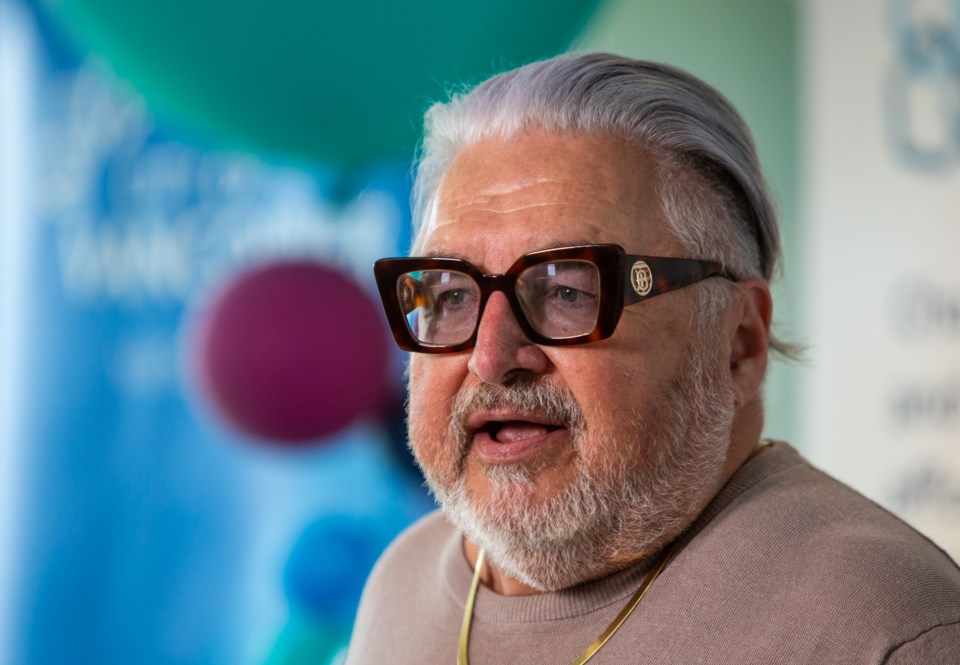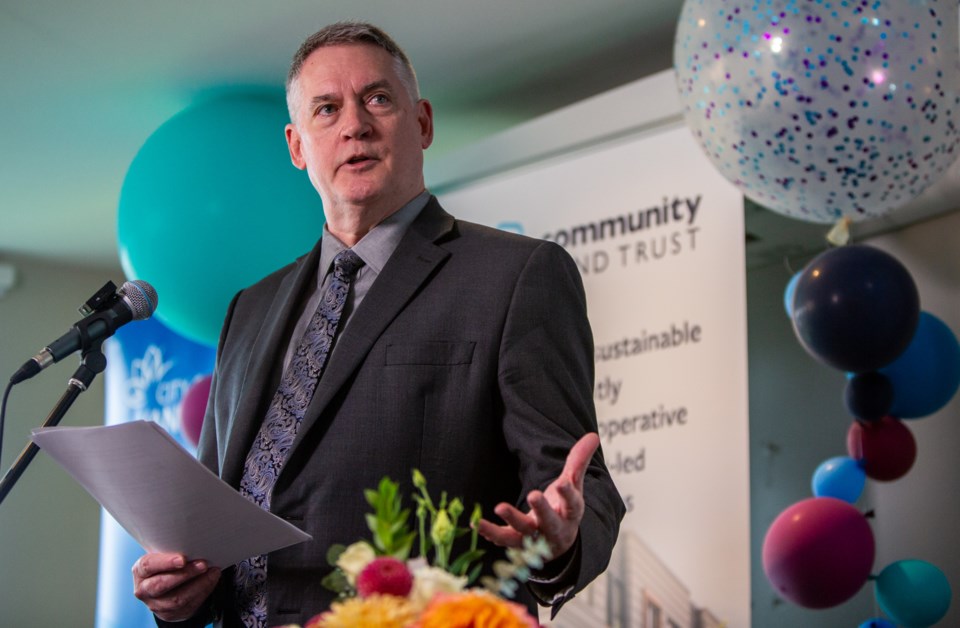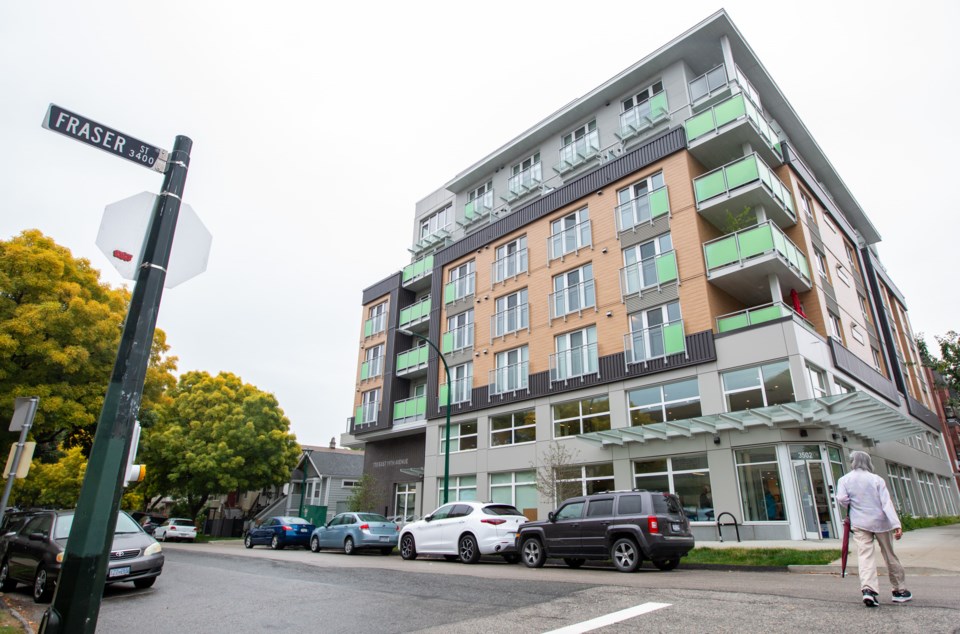Thom Armstrong asked a crowd of people Monday to imagine something that seniors desperate for affordable housing in Vancouver could actually not imagine: an affordable place to live, where no more than 30 per cent of a person’s income goes to rent.
Armstrong, CEO of the Co-operative Housing Federation of BC, was standing inside a room at the newly opened North Arm Housing Co-operative at East 19th Avenue and Fraser Street, when he leaned into a microphone at a news conference.
“Imagine retiring on a household income of $40,000 a year and calling this beautiful community — with this view of the Burrard Inlet — your home for $1,000 a month,” he said from the fifth floor.
“That's the reality of co-op housing in this day and age. These are the kinds of homes that our housing market is missing. And we need many more like it.”
The 58-unit, six-storey building is a mix of studio and one-bedroom apartments home to single people and couples 55 and older, who will pay on average $800 to $1,400 per month, said Armstrong in an interview after the news conference.
“It's a function of the unit type and people's incomes,” he said.
“It’s very, very affordable, given the average rents in Vancouver. We're talking about [co-op] members who earn anywhere from $35,000 to $45,000 [per year] — this is right in their affordability wheelhouse.”
At the same time, he acknowledged, many people are lined up to get a spot in a co-op in B.C. Some co-ops have closed their wait lists. The new North Arm building, however, has a wait list as short as six months.
B.C. has 270 co-ops, with 108 in Vancouver.

Homeless for 20 months
Richard Heikkila-Sawan, who attended Monday’s news conference, is currently living in temporary housing, but just got accepted to North Arm and will move in to a studio apartment by the end of the month.
Heikkila-Sawan, a retired artist, who has experienced being “renovicted” and was homeless for 20 months at one point in his life, has now found what he described as his “forever place.”
“It’s a brand-new building and, aesthetically, it's beautiful,” he told Glacier Media. “It's smaller than what I had hoped for, but it's very affordable because of that. I can really make it work.”
Heikkila-Sawan said his rent will be $975 per month, but a $450 monthly subsidy from an Indigenous organization will reduce it to $525.
He spoke to Glacier Media just moments after the B.C. government announced that landlords will be allowed to increase rent by 3.5 per cent next year.
While he is grateful to have found an affordable place, Heikkila-Sawan said he knows many people are struggling and another rent increase isn’t good news; more than 50 per cent of Vancouverites are renters, with 75 per cent of newcomers to the city also looking for rental accommodation.
“It should be zero,” he said of the increase.
“It should go backwards, not higher because landlords are making too much money as it is, especially landlords that have an older building and have done nothing to improve it or renovate it — and then they still get to charge more.”
The $20-million North Arm project was the result of a partnership involving the City of Vancouver (which owns the land), the B.C. government (which provided $10.8 million) and the Community Land Trust of B.C. (which holds a 60-year lease on the land and manages the building).
'Someone threw me a life ring'
Tiffany Duzita, executive director of the Land Trust, shared a message from one of the new tenants saying they felt like they were adrift in the ocean, “then someone threw me a life ring” in offering them an affordable place to live.
“This message reminded me of the reason why we do what we do,” said Duzita of the entity she runs that was created in 1993 the by Co-operative Housing Federation of BC. “We provide homes for people — homes that are affordable, and homes that are secure.”
But, Duzita added, it is not an easy feat to achieve at a time of rising interest costs, record high construction costs and labour shortages. She emphasized the need for partnerships to continue building more affordable housing.
The North Arm building was designed to include the 411 Seniors Centre Society, which will operate on the main floor, with a commercial kitchen, multi-purpose space and offices. The society hosted a separate grand opening Monday.
Housing Minister Ravi Kahlon said government is committed to building more co-ops in B.C., noting it is a request of many people across the province. He pointed to the government’s recent announcement of another round of applications being opened via the $3.3-billion community housing fund.
“The funding is available now not only this year, next year and the year after,” he said of the fund open to municipalities, non-profits, First Nations and others.
“So that if you're ready to go, then apply. But if you're not ready to go this year, don't worry, because we're going to continue to make the funding available for the coming years.”

'River running underneath us'
The new Vancouver co-op was named after the former North Arm wagon trail of the 1860s, which linked farms on the Fraser River to what is now False Creek.
That history is the reason construction costs were reduced by not including underground parking — not because it wasn’t in the plans, but because of the area’s boggy ground.
“Essentially, there’s a river running underneath us,” said Armstrong, who believes it might be the only co-op in Vancouver and possibly B.C. that doesn’t have underground parking.
Tenants were made aware of the lack of a parkade. Many don’t have vehicles, but buses run regularly along Fraser Street and car shares are available in what is a very walkable neighbourhood, despite some of the undulating sidewalks.
Meanwhile, Kahlon defended next year’s rent increase, saying the 3.5 per cent hike is well below the 12-month average inflation rate of 5.6 per cent.
“Global inflation is putting pressure on everyone, and we know that renters are having a real tough time right now,” Kahlon said. “We also know some landlords, with the rising interest rates, are also having a challenging time.”
Added Kahlon: “It’s a tricky balance to find, and I appreciate not everybody will be happy. I’m sure they’ll be critiques on both sides.”




